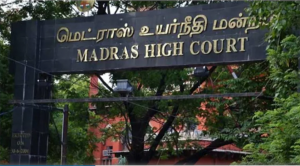 The Madras High Court in the case of Principal Chief Commissioner of GST and Central Excise v. Deepa Traders vide W.A.No.1091 of 2025, CMP Nos.8682, 8684 & 8685 of 2025 dated 01.04.2025, while supporting the decision of Bombay High Court in the case of Aberdare Technologies (P.) Ltd. v. CBDT & Customs which was later affirmed by Supreme Court, held that Clerical errors must be rectifiable even beyond statutory timelines. Denial of ITC to buyers for no fault of theirs results in double taxation. Software limitations are not a justifiable ground to deny rectification.
The Madras High Court in the case of Principal Chief Commissioner of GST and Central Excise v. Deepa Traders vide W.A.No.1091 of 2025, CMP Nos.8682, 8684 & 8685 of 2025 dated 01.04.2025, while supporting the decision of Bombay High Court in the case of Aberdare Technologies (P.) Ltd. v. CBDT & Customs which was later affirmed by Supreme Court, held that Clerical errors must be rectifiable even beyond statutory timelines. Denial of ITC to buyers for no fault of theirs results in double taxation. Software limitations are not a justifiable ground to deny rectification.
Facts of the Case: The petitioner had committed clerical errors in GSTR-1 returns for certain months of FY 2017–18, such as, Wrong GSTIN / Name of recipients, Incorrect invoice numbers/dates, Omission of some invoice-level details in GSTR-1 although Tax was properly discharged through GSTR-3B, IGST was inadvertently paid under CGST and SGST. The petitioner sought permission to correct these errors to ensure proper reconciliation and enable buyers to claim ITC.
Earlier, the Single Judge, held that there is no mala fide intent, and that tax liability had been fully discharged. Errors were purely clerical, affecting reconciliation and ITC of buyers. Reliance placed upon judgments in the case of Sun Dye Chem v. Assistant Commissioner, Pentacle Plant Machineries Pvt. Ltd. v. GST Council. Accordingly, permitted rectification despite absence of a specific mechanism under the portal.
However, the department filed the present Writ petition against such order and contended that Section 37(3) of the CGST Act, 2017, provides that “Rectification of errors in GSTR-1 must be made before the due date of GSTR-3B of September of the following financial year or filing of annual return, whichever is earlier”. Thus, rectification beyond that date was not permitted by law.
Held That: The Court herein referred the recent Supreme Court’s observations in Aberdare Technologies Pvt. Ltd. v. CBIC & Ors., wherein Supreme Court dismissed the SLP filed by the CBIC and affirmed the decision of Bombay High Court, allowing rectification of GSTR-1. Also, therein the Court emphasized on “Right to correct clerical/arithmetic errors is part of the right to conduct business. Portal/software limitations cannot justify denial.“
The Court herein observed that the errors, especially clerical ones are normal and inevitable. Denial of ITC to the purchaser for such errors leads to double taxation. Right to correct mistakes is a natural extension of the right to do business. The GST portal’s inability to permit corrections is not a ground to deny relief. Software should enable compliance, not create hurdles.
The Court allowed the petitioner to rectify the clerical errors in GSTR-1.


